U-he
U-he - Uhbik
U-he - Uhbik
Couldn't load pickup availability
Uhbik: Subtle to spectacular
A collection of nine sophisticated studio effects. Sleek, intuitive and powerful. Each effect comes as a separate plug-in, so you only load what you need when you need it. Create crazy effects chains or add a delicate final touch to your projects. Uhbik supports common surround formats. From subtle to spectacular, Uhbik is ready.

Uhbik-A: Ambience and reverb
Good reverb is seldom conspicuous, but when it is not there you notice something is missing.
Uhbik-A combines plate reverb and early reflections, with full control over each part to build the style of reverb you need. Sometimes you want a subtle touch of ambience, other times you want to float in space.
Uhbik-A has three operation modes designed for different reverb styles. All three share common controls that determine the spaciousness and feel. Bass and Treble shape the reflections, mimicking the absorptive properties of natural environments.
Add subtle space and texture or blend sounds together into warm clouds. Uhbik-A is a master of understatement.
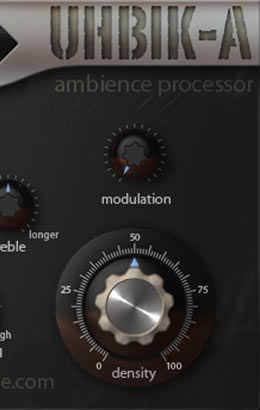
- 3 reverb algorithms: small, direct, open
- Adjustable pre-delay time
- Early reflection size, spread, damping
- Reverb early / late mix
- Decay time
- Bass and treble decay, treble cutoff
- Reverb density
- Dry / wet mix
- Plus shared features
Uhbik-D: Delay and echo
Inspired by classic tape echo units, Uhbik-D is a creative tool for vintage-style delays with digital enhancements.
Borrowing from the world of analogue tape echo, Uhbik-D has five taps (playback heads), time (tape speed), and feedback. Two filters and modulation controls add subtle to dramatic colour and motion to your delays, similar to those older tape machines.
Freed from the limitations of the real world, however, Uhbik-D can perform other tricks: Adjust each tap for extremely short delay times, feedback patterns, or create surround sound delays.
Uhbik-D is a big playground for creative delays packed into an easy interface. (If you want even more delay power, check out our more-feedback-machine MFM2)
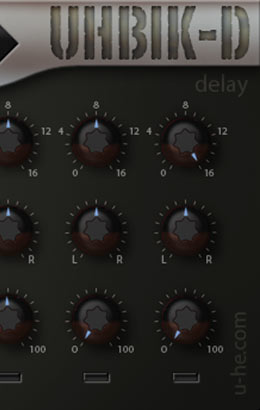
- 5 parallel taps with individual controls for delay time, pan, volume, feedback
- Global feedback control
- Tempo control with built-in modulation via simple LFO or tape flutter
- Highpass and lowpass filters with soft clip distortion
- Wet / dry mix
- Plus shared features
Uhbik-F: Flanger and chorus
The flanging effect comes in two traditional flavours: the twin tape machine method and the bucket brigade stomp box type. With Uhbik-F you get both—even at the same time if you want.
In through-zero mode (tape machine method), the audio is duplicated and the playback speed of one signal is slowed or sped up to create a dramatic “whooshing” effect. The LFO and the built-in delay determine the intensity and character of the flanging effect. The guitar pedal type delivers more subtle, chorus-like sounds by feeding back very short delays and modulating their delay times. In Uhbik-F you can choose either type or a mixture of the two.
Uhbik-F comes with a few extras to enhance your final effect: Drive, a highpass filter to manage bass frequencies, and a feedback control (positive or negative) for intensifying the resonance in one of two different flavours.
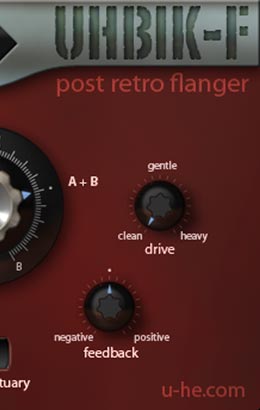
- Quality mode switch: normal or eco
- LFO depth
- Tape machines mix control with modulation option via Automix
- Positive or negative feedback
- Bass sanctuary
- Drive
- Extra delay for further chorus / flange effects
- LFO: Host-synced or absolute times, with wide range continuous control
- LFO shape controls: wave shape, horizontal size and vertical size
- LFO phase position with channel offset
- Plus shared features
Uhbik-G: Granular pitch shifter
Granular pitch shifters break incoming audio into small pieces (grains) of adjustable length (grain size), then play them back at variable rates.
By manipulating grains, Uhbik-G is capable of producing a wide range of effects from simple doubling to dramatic alien soundscapes. Transpose the pitch of each grain in semitones or scale the grain playback speed—which can be negative for unusual reverse effects. Surround sound capability lets you send differently scaled grains to each available channel.
Uhbik-G has a second mode capable of a very different effect: phase vocoding. The phase vocoder mode uses time-stretching / compressing for pitch shifting. Try it on your vocals for curious results.
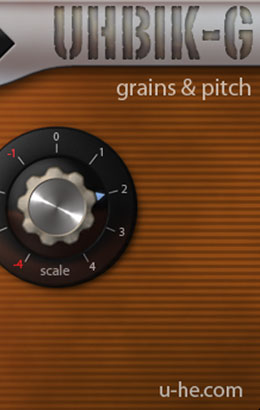
- Granular pitch shift or vocoder operation mode
- Grain size control, up to approximately 2 seconds
- Pitch shift in semitones and octaves (scale 0 to 4)
- Scale includes reverse playback option
- Offset allows different effect per audio channel
- Feedback for multiple detuning
- Manual or auto reset
- Wet / dry mix
- Plus shared features
Uhbik-P: Phaser
Another studio staple, phasers adds movement and colour. With 42 allpass filters, Uhbik-P delivers some of the deepest, warmest phasing available. But a little nudge turns it into a metal monster.
Uhbik-P is capable of many distinct sonic flavours by adjusting the filter frequency and feedback. Frequency adjustments move the filter ’comb‘ (peaks and troughs) around the spectrum, and feedback (positive or negative) widens the distance between peaks. You can control these manually, use automation or let the built-in LFO handle it.
With its built-in LFO and the other options common to all Uhbiks, Uhbik-P is a dramatic modulation device in a simple, sleek UI. Angelic shimmers and metallic textures await.
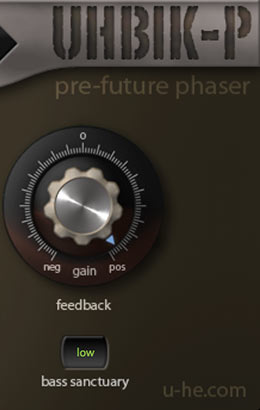
- Granular pitch shift or vocoder operation mode
- Up to 42 allpass filters
- LFO modulation depth control
- Spectrum (comb frequency)
- Positive or negative feedback amount
- Bass sanctuary: highpass filter eliminates bass resonances
- Dry / wet mix
- LFO: Host-synced or absolute times, with wide range continuous control
- LFO shape controls: wave shape, horizontal size and vertical size
- LFO phase position with channel offset
- Plus shared features
Uhbik-Q: Semi-parametric equalizer
From simple bass and treble knobs to massive 31 band graphic EQs, equalization is an essential part the recording process. Much can be (and has been) said about which features and qualities make the best EQs.
Uhbik-Q takes a streamlined approach to EQ. Maximum flexibility with an absolute minimum of controls. Maximum audio quality with low CPU usage. Tweakable but with smart automatic behaviour.
Uhbik-Q has two semi-parametric bands with switchable shelf and bell curves; adjust the frequency and the Q-factor is automatically adjusted for you. There are two additional filters for high and low cuts, and a dedicated low-shelf filter for handling bass frequencies.
Uhbik-Q does all an EQ should without affecting your workflow. Chock full of creative options, but uncluttered and simple to use.
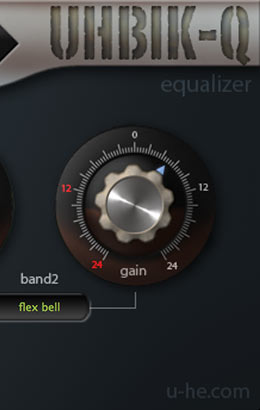
- 2 semi-parametric equalizer bands with 6 modes: off, low shelf, wide bell, flex bell, narrow bell, high shelf
- Adjustable frequency and signal gain per band
- 2 quasi brick-wall filters with selectable frequency (1 high cut, 1 low cut)
- Bass gain (+/− 24dB) with selectable frequency
- Output gain (+/− 24dB) or switchable extra ‘bell’ type filter
- Plus shared features
Runciter: Distorting filter
Filters are popular sound-shaping tools—cutting and boosting frequencies, adding resonance. Perfect for performing dramatic sweeps, as we all know.
But Runciter is more than a high quality state-variable filter. It also contains some serious distortion circuitry.
Modulate the cutoff frequency manually, with the built-in envelope or via MIDI (breath, velocity, modwheel etc.). Attach a MIDI foot pedal and make your own wah/fuzz box.
The distortion options are capable of anything from mild grit to total sonic destruction. Dial in a little Fuzz, adjust the tone and you have some delicious tube distortion textures. Crank the Drive to push the distortion circuits even harder. Have fun… but watch your speakers.
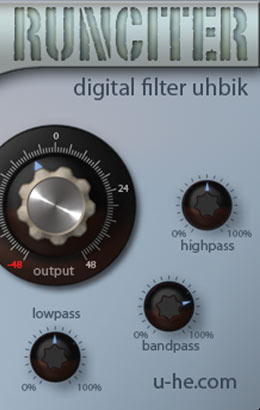
- Parallel low-, band- and highpass filter outputs with independent level controls
- Logarithmic cutoff control from 20Hz to 20kHz
- Filter resonance
- Built-in envelope follower (6 modes) for cutoff modulation, with sensitivity and rate controls
- MIDI control via mod wheel, pitch wheel, user-definable CC, gate, key follow, velocity, aftertouch
- Fuzz distortion with colour (tone) control
- Input drive +/- 48dB
- Output level control
- Wet / dry mix
- Plus shared features
Uhbik-S: Frequency shifter
Uhbik-S is a frequency shifter. There are similarities to chorus and phasing, but the movement in Uhbik-S is continuous, not back and forth via LFO.
The frequency range and shift is where you control that movement. Shift adjusts the amount of frequency shift (up and down) from the value set by the range option. Dial in some frequency offset to create psychedelic spatial effects.
Uhbik-S never compromises audio quality and minimizes certain side-effects commonly associated with frequency shifters.
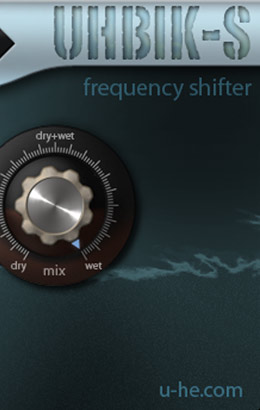
- Variable frequency range: 1Hz, 10Hz, 200Hz and 4kHz
- Frequency offset for spatial effects
- Channel offset for per channel effect
- Phase control (0-360°)
- Synchronization via manual or auto reset
- Positive or negative feedback
- Dry / wet mix
- Plus shared features
Uhbik-T: Tremolo and panning
Tremolo in its simplest form is variation in volume, an LFO modulating amplitude. Uhbik-T goes beyond basic ‘volume wobbling’ into multi-purpose rhythm creation. Uhbik-T’s LFO affects three parameters at the same time: volume, filter cutoff and stereo (or surround) position.
You can play with the regular LFO settings for some interesting synchronized effects, but to push Uhbik-T even further we added user-definable patterns with up to 16 steps. These replace the LFO and open up many more possibilities, turning the definition of a tremolo effect on its head.
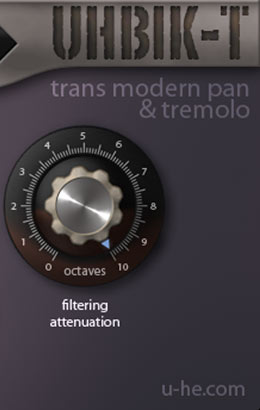
- Gain law either linear or exponential at −12dB, −30dB or −96dB
- Haas delay length, created using channel offset
- Adjustable filter cutoff
- User-definable patterns in an 11x16 grid
- 6 operation modes for LFO behaviour: Wave, Wave x2, Wave x3, Wave x4, Pattern X, Pattern Y
- LFO: Host-synced or absolute times, with wide range continuous control
System Compatibility
Plugin available in the VST2, VST3, Audio Unit (AU) and AAX* plug-in formats and is an M1 compatible synth plugin.
macOS:
AUv2, VST2, VST3, 64-bit only
temporarily no AAX (read more)
Windows:
VST2, VST3, AAX*
32-/64-bit
Plugin System Requirements:
- Host Digital Audio Workstation (DAW)
- 1GB RAM, more recommended
- 50MB free disk space
- 1000 × 600 or larger display
- Modern CPU required:
- Windows/Linux: Intel Nehalem or newer, AMD Bulldozer or newer
- Mac: Intel Nehalem or newer, Apple M1























